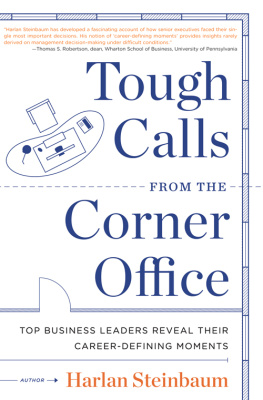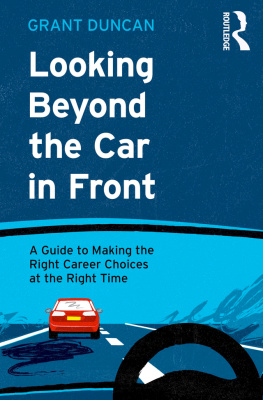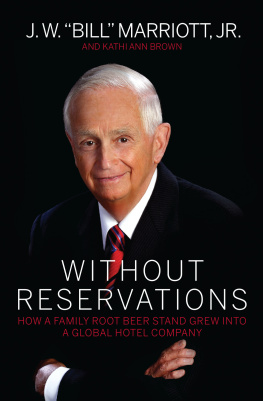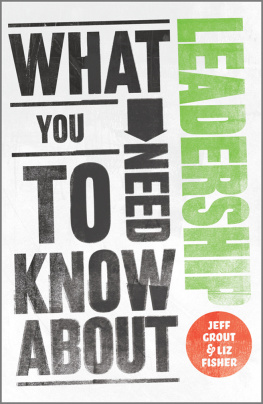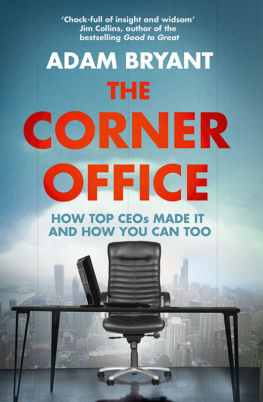Tough Calls from the Corner Office
Top Business Leaders Reveal Their Career-Defining Moments
H ARLAN S TEINBAUM
with Dave Conti and Michael Steinbaum

Dedication
F OR MY WIFE, J O A NN G LASER S TEINBAUM (19362006)
She was my confidante and best friend. Her smile said it all.
She will be forever in my heart.
Contents
The Road Taken: Making Key Career Choices
Danny Meyer, Union SquareHospitality Group
Angela F. Braly, WellPoint,Inc.
James H. Speed Jr., NorthCarolina Mutual Life Insurance Company
Joseph Plumeri, Willis GroupHoldings Ltd.
Clarence C. Barksdale, CenterreBancorporation
Gerald Greenwald, UnitedAirlines, Chrysler Corporation
Leaving the Mother Ship: Taking the Entrepreneurial Leap
Bill Rasmussen, ESPN
David L. Steward, World WideTechnology
Maxine Clark, Build-A-BearWorkshop
Leo R. Jalenak Jr., Cleo Inc
Love and Marriage: Finding or Shedding Business Partners
Michael Staenberg, THF RealtyCorporation
Gyo Obata, Hellmuth, Obata, andKassabaum (HOK)
Jack C. Taylor, EnterpriseRent-A-Car
Betting the Farm: Risking Success for More Success
Monty Hall, Lets Make a Deal
Frank Jacobs, JacobsInternational, Falcon Products
Jerry Finger, Finger InterestsLtd., Charter Bancshares
John D. Graham, Fleishman-Hillard, Inc.
Lee Liberman, Laclede GasCompany
Hearts and Minds: Creating a New Corporate Culture
Sanford N. McDonnell, McDonnellDouglas Corporation
Benjamin F. Edwards, A. G.Edwards
David Farrell, May DepartmentStores Company
Reginald Brack, Time Inc.
William C. Swaney, PerrigoCompany
The Mother of Invention: Transforming the Companys Business Model
Shelly Lazarus, Ogilvy &Mather Worldwide
Lester Sherman, Wohl ShoeCompany
Albert E. Suter, EmersonElectric Company, Whirlpool Corporation, Firestone Corporation
John F. McDonnell, McDonnellDouglas Corporation
James Nixon, WhitmansChocolate Company
Lloyd Schermer, Lee Enterprises
Sea Change: Repositioning, Refocusing, and Renewing a Business
Richard Mahoney, MonsantoCompany
Les Loewe, Angelica Corporation
Ronald M. Shaich, Panera BreadCompany
Frederic V. Salerno, Verizon,New York Telephone Company
Hans Sternberg, Starmount LifeInsurance Company
Susan S. Elliott, SystemsService Enterprises, Inc. (SSE)
When to Fold Em: Knowing When Its Time to Step Aside
George Herbert Walker III, Stifel, Nicolaus & Company, U.S. Ambassador to Hungary
Barney Ebsworth, INTRAV, RoyalCruise Line, Clipper Cruise Line
Paths to Service: Defining Moments That Transcend Business
General John W. Handy, U.S.Transportation Command (USTRANSCOM)
Tadataka (Tachi) Yamada, GlobalHealth Program of the Bill and Melinda Gates Foundation
Executive Advice and Wisdom
W hat if you could have private conversations with some of the top executives and business builders in the country?
What if you could sit down with them and discuss the most important decisions of their careers, the moments that made them what they are, the catalysts that pushed their companies to the pinnacle of success and created their legacies for all time? Imagine what you would learn: the lessons, principles, strategies, ideas, and solutions to all the business issues you might encounter in a lifetime.
I decided to do just that. I reached out to some of the most successful and respected businesspeople in corporate Americaleaders from companies such as Verizon, Chrysler, McDonnell Douglas (now part of Boeing), ESPN, Ogilvy & Mather, A. G. Edwards (now part of Wells Fargo), Fleishman-Hillard, Enterprise Rent-A-Car, WellPoint, and Panera Bread Company. The results are in your hands: a treasure trove of rich business wisdom, stories of tough decisions and hard-won victories, and lessons from lifetimes of achievement.
My name is Harlan Steinbaum, and I am a former CEO.
In looking back over my own career in business, I realized that among the many choices and decisions I had made, there was one that stood out above all the rest in terms of its impact on my company, my career, my family, and my subsequent success.
It was the moment when my brothers-in-law and I decided to buy back the family business from the conglomerate that had purchased it from us several years earlierand to run it ourselves once again. That decision, and the actions that flowed from it, came to define me and my life in business. My life would never be the same because of that decision. It was the gateway to my future. It was my defining moment.
Over the years Ive become fascinated with these career-defining points in time, not only because they are so often interesting and dramatic as stories in and of themselves, but also because they have so much to teach us.
A defining moment, I have found, isnt always the decision that makes the most money for the company or the person. Years after buying back the family business, we founded a very successful joint venture called Express Scripts. Yet, in looking back, I dont find that that decision or the resulting enterprise, as successful as it was, really defined me professionally.
In my view, a defining moment is the decision or action a person takes that has the greatest impact on his or her career. Its a moment that shapes us as individuals and as businesspeople and sets the trajectory for the events that follow. It doesnt necessarily have a positive short-term outcome. Sometimes our most significant learning experiences come from our failures, not our successes.
Many of us wont know our defining moment until we reflect on our careers after the passage of time to see how certain events, decisions, and judgments played outwhen we can measure their effect on us and our work. Thats how it was for me. Even after many years, I can still clearly see my own defining moment. It began with my restlessness and dissatisfaction with the status quo and my desire to take greater control of my future.
My defining moment starts with a company called Medicare-Glaser Corporation, a retail chain of drugstores and pharmacies. The company was founded by my father-in-law, Morris Glaser, in 1923. (By the way, we had nothing to do with the U.S. governments Medicare program, and in fact we had the name before that program was created.) At one point we owned stores in Missouri, Illinois, Connecticut, Tennessee, and New York. In all, we owned and operated over one hundred stores. As the company grew, we became the first drug chain to open its own chain of stand-alone retail pharmacies, with a focus on dispensing discounted prescriptions. Its purpose was to help the many people who could not afford the cost of their medications.
In 1970 I became president of the Glaser Drug Stores and Medicare Pharmacies. Soon after, we began to consider an initial public offering to provide additional capital to grow the business. In 1972, while these discussions were taking place, we were contacted by Pet, Inc., a diversified conglomerate listed on the New York Stock Exchange. Pet was interested in acquiring us. After months of discussions, we decided to make a deal and become a division of Pet.
When Pet first became interested in purchasing our drugstore chain, we were enthralled by the prospects. Pets plan was to grow the chain into a nationwide competitor. With its resources, we could expand both organically and through acquisition on a scale we had never dreamed of before, and we could then really compete with the big boys in our industry.
I was tired of seeing a Walgreens open up across the street from virtually every store we opened. Walgreens, with its size and sheer buying power, would lower prices on key products to get people in its doors. It could sustain lower prices much longer than we could. As a result, we had to be more innovative than Walgreens to keep our customers from going across the street. Now, as part of Pet, we would finally play ball with Walgreens on a more level playing field.
Next page
